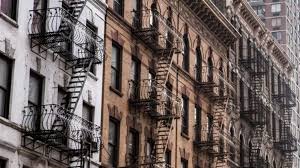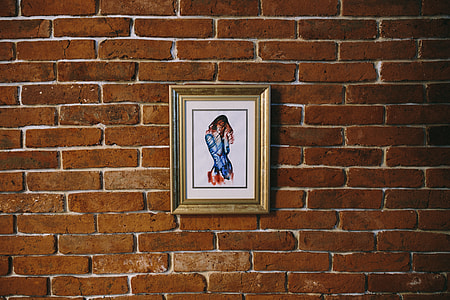Isabella lived alone in a one bedroom apartment on the 24th floor of a high-rise apartment building in Manhattan, New York. She didn’t enjoy taking the elevator. She was slightly claustrophobic and had nagging anxiety about having a power outage, or worse. Ever since 9/11, she had a looming apprehension that if there were a fire, or a bomb, she would never get out of the building. She’d tried over the years to get an apartment on a lower floor so she could walk up the stairs, but getting an apartment in Manhattan was an adventure in itself, something you had to fight for like a champion prize fighter, so she resigned herself to living on the 24th floor, and said a little prayer every time she was in the elevator.
Isabella would never leave Manhattan; she was a true city dweller. Aside from the occasional venturing out of the city to visit someone, or to travel a few times a year for vacations, she rarely needed to leave. Why would she? Everything she needed was at her fingertips. Every type of cuisine that existed in the world was within blocks, culture was everywhere, should one desire it – theater, museums, Broadway, bookstores, every type of store, every type of entertainment – the list was endless. And, if she was craving a longer view or nature, there was Central Park, the rivers that surrounded Manhattan, or the upmteen flower gardens. People from every part of the world lived there, so she got a flavor from every country. Mass transit made travel easy. Manhattan was a microcosm of the world. Isabella could not imagine how other people could not feel safe here. To her, it was a haven of safety and security, even after 9-11. It was home, and it was a haven . . . until now..
In the quarantine, somehow, her beloved city had become the scariest place on earth. In New York, more people were getting sick from the virus, sick more quickly, and dying, than anywhere around the world. Nothing was safe. Everything you touched could potentially kill you, or at least, make you sick.
Isabella had never seen the streets so empty, at least not since 9/11, and even then, that only lasted for a few days. That was traumatic, certainly, and it took several years for the city to recover, but it was an isolated incident and they knew who the enemy was. In addition, they knew what had to be done after the fact. Regular life resumed pretty quickly. They were, after all, badass New Yorkers.
But the quarantine was categorically different. This was guerilla warfare with an invisible enemy that could strike anywhere, anytime. In the past, Isabella had some anxiety, which she briefly band-aided with pharmaceuticals from the doctor as a matter of survival, until she learned better coping mechanisms. The anxiety returned after 9-11 for a while, but she joined one of the many support groups available and got back to normal within a few months. Now, in the quarantine, she could feel the anxiety mounting again. She tried anything she could think of to quell it. Deep breathing and yoga only did so much. Sometimes, she resorted to tranquilizers again. At times, she just drank some wine, along with other friends, in a virtual (online) cocktail hour. It was getting more difficult by the minute to push the anxiety down.
But unlike after 9-11 and the crashing of the World Trade Center, this time there would be nobody to comfort her. She couldn’t ask strangers in some group to embrace her in a group hug; contact with strangers could kill her now. Surely, she was living in some dystopian reality and not in the heart of New York City.

When Isabella was at home in her apartment on the 24th floor, the reality of the virus that threatened everyone on the globe – the virus that had no cure, no vaccine, and no enemy – was only a story. It had no basis in reality. But when she had to venture out onto the streets of Manhattan, the world came crashing around upon her. Isabella was not agoraphobic, had never been a germaphobe, was not really frightened by anything other than her own obsessive mind. Now, her fears were not in her mind – they were starkly real.
There were times when being holed up in her apartment was very comforting and peaceful. She could really focus on her work. Luckily, there were things she could do from home regarding work – video meetings, research, phone calls, documents to write. She was lucky that way. All her personal projects helped. She took classes online – things she never imagined she would learn, like origami, crocheting and how to speak Hebrew. She read books, was writing a screenplay, and trying out new recipes.
Isabella rather liked cooking, but hadn’t gotten a chance to do much recently. While it was true that restaurants were allowed to cook food and deliver it, she really didn’t trust the cooks to be wearing masks or sanitizing their hands. So, she decided to emulate Julie in that movie, Julie / Julia, where the main character worked her way through a new recipe in Mastering the Art of French Cooking : The Joy of Cooking, by Julia Child, every day for a year. Sometimes, Isabella improvised, creating her own recipes, and sometimes she followed popular chefs like Gordon Ramsey or Bobby Flay. She had found a whole new creative outlet. Since she couldn’t find everything she needed for ingredients in the quarantine lockdown, she got really creative with the ingredients available to her. It was actually a fun challenge. Also, it was a terrifying ordeal going to the store.
Every time Isabella went out, she had to wear a mask and stay 6 feet away from everyone, even the people she had seen every week for several decades. She really hated the mask – it was so uncomfortable – but eventually she got used to it. Everyone looked either like they were working in a hospital or robbing a bank.
At least, when she went out, she could talk to someone for a few moments, a live human who was not on video. There was Moishe, the deli owner. He was an old, short Jewish man, slightly hunched over, who probably slept in his apron. He wore a yarmulke and spoke with a Yiddish accent, and always gave her the best cuts of meat. Boris, the fruit and veggie guy at the local grocery, a Ukranian man who could have passed for a middle easterner and always talked politics with her, complaining about the Russians. They almost always argued, but it was a great, intellectual pastime for both of them. The market had been there for over 50 years, with rotting wooden shelves and indelible stains on the floors.
She was lucky enough to live near one of the most famous international markets in the city, shelves overflowing with items of all kinds – coffees and cheeses and gourmet delicacies from around the world. Tourists as well as New Yorkers loved this place – crowded, loud, and fantastic! Sometimes Isabella wandered around in it just to pretend she was in another country, and smell the aromas that surrounded her.
She was so glad that she lived in an old neighborhood in the city; it was like a small town where everyone knew each other. This was her de facto family – people who lived in proximity and were her social milieu, and she unconsciously counted on them to sustain her emotionally. She never felt alone in her big-city-small-town-village.

But now, she rarely ventured outside, and when she did, it was a mortifying experience. Some of the stores she’d frequented for many years were closed. Isabella thought she was going shopping, but in actuality, she was visiting with the shopkeepers. Now, she couldn’t even get close enough to kibitz. Now, many of them were quarantined. She didn’t even know where they lived. It was as if her entire village had suddenly disappeared into some twilight zone.
When she returned home from this apocalyptic twilight, she would remove all her clothes immediately and leave them by the door. She had taken to leaving her laundry basket there. Then, she would take all the groceries, put them down on the counter and wipe everything down with a solution of water and bleach – the outside of every container, every package, and she even dumped the perishables in the diluted bleach water for a few moments. Then, she would take the fabric grocery bags and put them in the laundry. Finally, she would wipe down the counters where the items had been.
As soon as that ordeal was over, she would run to the shower and wash her entire body and her hair. And cry. She would just stand in the water and cry, sometimes heavy sobs that shook her body. Not that it mattered, but her tears melded with the streams of water from the shower, so she could barely tell where the tears left off and the shower began. It felt good to ‘become’ the water.
Water was purifying, and the running water made Isabella pure again. Surely, after this ritual, in which she scrubbed her body practially raw with soap as well as water, she would be cleansed – of the other humans who had picked her food in the fields, of those who had packaged her food, put the food on the shelves, or exchanged money with her when she bought the food, and of the people who might have touched the food on the shelves before she bought it. Anyone could have the virus. The metal shelves that the food was on could hold the virus for several days. The plastic packages could hold the virus for days. There was just no way to know who touched what. So, after bleaching the food and the packages and the counters, she showered for a very long time.

But food wasn’t just for eating and creating innovative concoctions. Food was for gathering. Since humans first appeared, eating had been a ritual. It was a routine for women who gathered berries off bushes, carrying babies with them, talking and laughing and bonding with their sisters. Men, who went off to hunt, bonded with their brothers, boasting and ribbing each other, and doing whatever it is men do when the womenfolk aren’t around. Eating wasn’t just about food, which is what made humans unique animals. Eating has always been about ritual, and gathering with others.
Isabella had a theory that one factor of the downfall of humans was that many of them had stopped eating around the table with their family or friends. Even when they did, they stared rudely at their phones. But that’s what made New York City such a special place. There were hundreds of restaurants within a few blocks of her apartment. Going out to eat kept her socially connected with friends and family.
Now, though, she was getting tired of cooking all the time. She was getting tired of eating alone, tired of cooking just for herself, tired of figuring out what to cook next. Sometimes, she would join the billions of others around the world by eating comfort foods. There were memes constantly circulating the web that made fun of the fact that people were overeating regularly. Humor was one of the only defenses they had against this damned virus, to keep everyone mentally and emotionally sane. And eating.
In order to make sure she stayed healthy during the quarantine, and to keep her clothes fitting, she only bought a few snack foods with each jaunt to the store and rationed them per day. This felt like war, for sure, like when people would ration food and other resources during WWII. At least this was something she could control, since she couldn’t control the virus that was looming everywhere. Each time she went shopping, she would buy a few decadent, chemical-laden yummies that she would ordinarily never buy. This week it was Cheetos and cookies. The last time she made a grocery run it was coffee ice cream, pretzels, and licorice.
Then, there were times when she thought she would go completely out of her mind. It wasn’t really boredom – she had plenty to do. It was ennui, malaise, a need to escape when she thought she would go completely mad. Isabella felt trapped – more claustrophobic than she did in her building’s elevator. While she did have a working internet, thank heavens, and talked to everyone she knew on video chats, it just wasn’t enough sometimes. She felt like a caged animal, and wondered if there were still insane asylums anywhere and if she might have to be put in one someday.
When Isabella was feeling this way, she bit her nails (whoops, people were not supposed to put their hands in their mouths for fear of the virus), she paced the floor. Sometimes she watched TV, but sometimes even that wasn’t enough. One day she decided to get her exercises by walking down the 24 flights of stairs, but by the time she reached the 10th floor on the way back up, she lost her breath and had to take the elevator the rest of the way. That’s when she decided that the stairs would be her exercise gym, except, what if she met someone on the stairs and couldn’t social distance? Well, she would cross that step when she came to it.
But one day, she didn’t want to ascend or descend stairs. One day she didn’t want to do anything that she could do or had available to do. She wanted OUT!! But they were giving fines to people who went outside with no purpose – $1000 fines to people who wouldn’t social distance, which was hard to do in the NY city streets.
“Aargghhhh!!!!!!” she screamed. The people on the floor below knocked on the ceiling. “Aarrgghhhhh!!!” she screamed louder. The neighbors knocked on her door, wanting to know if everything was okay in there. Looking out the peephole in the door, she saw that they had their masks on. Still, she didn’t open the door, but thanked them for their kind concern.

Isabella went into the shower, turned on the water, and screamed. She screamed and she cried and screamed and cried until she had no more energy to do either. She slid her body down onto the floor and stayed there, her hands hung between her legs in despair, not moving, her face expressionless. Maybe 10 minutes passed, maybe an hour. Finally, the water turned cold, and she shivered. She turned off the water, toweled off, and looked in the mirror. A listless face stared back at her. She had nothing left. Not one shred of passion, or motivation, or desire, or thought. She stared into her own eyes for a long time, looking for a spark of life. There was nothing. She was empty.
It was a long, holiday weekend. How could anyone know the difference anymore? She didn’t have to work for 4 days. She crawled into bed. That was the only safe place left. That was the only place she could find comfort, the only place to hide, the only escape. Her bed was big and comfortable, with a plush comforter (no surprise it was called a comforter), perfect feather pillows, and 500 count sheets as soft as baby’s hair. Isabella loved her small, Manhattan bedroom. She had painted the walls herself – lavender on 2 of them, cream on the other. The walls held art that made her feel cozy and dreamy and peaceful. A painting of flowers with large petals, in hues of purples and blues and soft pinks, painted in a hazy, impressionist fashion like those of Monet. A wooden wall sculpture that resembled lovers in an embrace. A wall sculpture of hummingbirds with iridescent colors. A fabric wall hanging of the chakras.
Isabella crawled into that bed and pulled up the covers. She stared for some time at the art on the walls. She thought of listening to a podcast, or watching something on YouTube, or putting on some music, but even that seemed arduous. She didn’t want to hear anything. She didn’t want reality to seep in even for a moment. She listened to the silence that one rarely hears in Manhattan, even on the 24th floor. There was peace in the silence. She didn’t want to sleep, because she wanted to embrace the silence and revel in being alive in it. She fell asleep anyway, coming in and out of consciousness for several days. In her reverie, images floated by and she dreamt. In her bed, there was peace. The world existed only inside of her.

Kevon Lindenberg
Robin Engel
Jeremy
Robin Engel
Jeremy